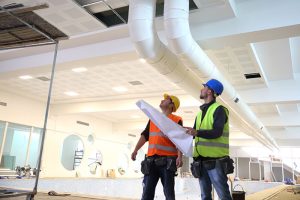 The healthcare industry in the United States is experiencing rapid growth, with six out of ten Americans suffering from at least one chronic disease, according to the CDC. As the demand for healthcare facilities continues to rise, it becomes crucial to renovate existing buildings and construct new ones to accommodate the increasing number of patients and advancements in medical technology. In this comprehensive guide, we will explore the factors to consider when selecting a healthcare construction contractor for your project. From experience and client satisfaction to safety compliance and augmented reality capabilities, we will cover all the essential aspects you need to evaluate before making your decision.
The healthcare industry in the United States is experiencing rapid growth, with six out of ten Americans suffering from at least one chronic disease, according to the CDC. As the demand for healthcare facilities continues to rise, it becomes crucial to renovate existing buildings and construct new ones to accommodate the increasing number of patients and advancements in medical technology. In this comprehensive guide, we will explore the factors to consider when selecting a healthcare construction contractor for your project. From experience and client satisfaction to safety compliance and augmented reality capabilities, we will cover all the essential aspects you need to evaluate before making your decision.
Understanding Healthcare Construction
Healthcare construction is a specialized field within the broader non-residential construction industry. It focuses on the design, construction, and renovation of healthcare facilities such as hospitals, clinics, and doctor’s offices. The construction of healthcare facilities can be divided into two main categories based on building codes: hospitals and clinics. Hospitals, categorized under Group I Occupancy (Institutional), operate around the clock and cater to patients who may require immediate assistance during emergencies. On the other hand, clinics, designated as Group B Occupancy (Business), are smaller healthcare facilities that provide outpatient services. Both hospitals and clinics have unique building requirements that distinguish them from general construction projects. These requirements include health and safety concerns, minimizing disruption to ongoing services, and accommodating specialized medical equipment.
The Importance of Experienced Healthcare Construction Contractors
Healthcare construction projects have specific demands that require contractors with expertise in this field. Hiring experienced healthcare construction contractors is crucial for several reasons:
Health & Safety Concerns
Healthcare facilities must adhere to higher standards of air quality and fire safety to ensure the well-being and safety of patients and staff. Contractors must consider these aspects from the initial design stage and address them throughout the construction or renovation process.
Additionally, ongoing healthcare operations in already occupied facilities pose additional challenges. Contractors must minimize noise and dust levels to maintain a safe and comfortable environment for patients. Infection Control Risk Assessment (ICRA) is also necessary to prevent the spread of contagions during construction or renovation projects.
Minimize Disruption
Unlike other construction projects, healthcare facilities cannot be easily evacuated or shut down for extended periods. Interim Life Safety Measures (ILSMs) are implemented in hospitals to ensure that layout changes or system shutdowns do not affect the day-to-day operations.
Renovation projects near patient rooms in hospitals are often conducted during the daytime, while private clinics may schedule such projects at night to minimize disruption to daytime operations.
Medical Equipment Considerations
Healthcare facilities rely on advanced diagnostic machines and medical devices, which have specific operating conditions, safety guidelines, and power requirements. Contractors must design the building plans to accommodate these unique needs. Moreover, as medical technology rapidly evolves, contractors should possess advanced knowledge of the latest medical devices and their requirements.
Key Considerations When Selecting a Healthcare Construction Contractor
Choosing the right healthcare construction contractor is vital for the long-term success of your facility in providing quality patient care. Here are seven essential factors to consider when hiring a healthcare construction contractor for your project:
Experience
While some may argue that construction projects are similar, healthcare projects have specific nuances that require the expertise of contractors experienced in healthcare construction. From the design phase to the actual construction, attention to patient safety, comfort, and efficient workflow is crucial.
For instance, a dental office requires soundproof treatment rooms and a warm, comforting ambiance in waiting areas. The flow of patients, doctors, and administrative staff must also be optimized. Contractors with direct experience in healthcare construction can address these specific requirements effectively.
Satisfied Clients
Experience alone is not enough; the quality of work is equally important. Before finalizing a contractor, check their track record and ask for references from past clients. Contact these clients directly to gather information about construction quality, safety standards adherence, communication style, and ability to meet deadlines.
Pre-Construction Experience
Consider whether you prefer the traditional design-bid-build approach or a design-build approach. The traditional method involves separate architectural firms for design and general contractors for construction, while the design-build approach combines both stages. The design-build approach eliminates the bidding process, saving time and allowing construction to start sooner.
When evaluating a contractor’s pre-construction expertise, review their track record in past healthcare construction projects. Assess the quality of their designs and their ability to meet modern standards.
Safety Compliance
Construction is inherently hazardous, and contractors must prioritize workplace safety. Check the contractor’s safety record and ensure they adhere to Occupational Safety and Health Administration (OSHA) standards. You can review their official OSHA records to assess their recent track record on workplace safety.
License & Insurance
Verify that the contractor holds the necessary licenses and meets the requirements set by your state and local jurisdiction. Additionally, check if they are part of notable industry associations. Insurance coverage is also crucial to protect against any damage to your property and extend liability coverage.
Augmented Reality Capabilities
Consider contractors who utilize augmented reality (AR) technology during the design phase. AR allows you to visualize the finished project before construction begins, helping you identify any potential issues or improvements. Contractors offering AR capabilities provide a clearer understanding of the final design, minimizing surprises and cost overruns.
Financial Stability
Evaluate the financial position of the contractor to ensure they have the resources to complete the project without financial constraints. Healthcare projects often involve higher costs due to safety requirements and specialized equipment. A financially stable contractor with experience in procuring medical equipment at affordable prices is advantageous.
We Provide General Commercial Contracting Services
We oversee construction projects from the beginning to the end. This includes designing, planning, building, and managing the entire process. We are responsible for coordinating with architects, engineers, and other subcontractors to ensure that the project is completed within the set timeline and budget.
> Learn More
Remember to ensure the efficient and successful completion of healthcare construction projects, it is essential to hire the right healthcare construction contractor. These contractors specialize in designing, constructing, and renovating healthcare facilities such as hospitals and clinics, taking into account the unique requirements and challenges of the healthcare industry.
Contact us (513-617-1401) for more information or a quote
—

About ABS Services
ABS Services provides comprehensive commercial construction services to Greater Cincinnati, Northern Kentucky, and Southeast Indiana. We have the experience, equipment, and the right team to get the job done!
> Learn More
